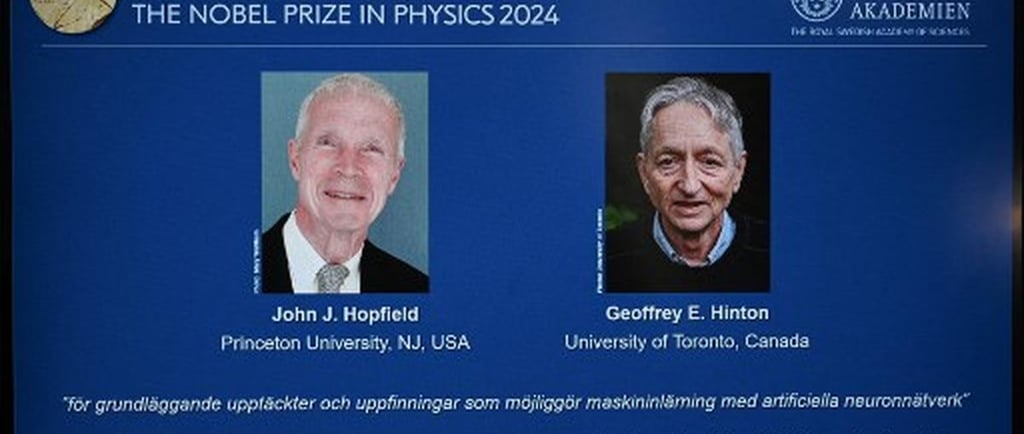The ‘Godfather of AI’ Receives Nobel Prize in Physics: What Does This Mean for the Future of Science and Technology?
The 2024 Nobel Prize in Physics has taken a fascinating turn with the awarding of the prestigious honor to the so-called “Godfather of AI.” While Artificial Intelligence (AI) has been making waves in various fields, its recognition in the realm of physics signals a paradigm shift in how we perceive the boundaries between traditional sciences and emerging technologies. But what does this landmark event mean for the future of science, technology, and our society as a whole?
10/10/20243 min read


The 2024 Nobel Prize in Physics has taken a fascinating turn with the awarding of the prestigious honor to the so-called “Godfather of AI.” While Artificial Intelligence (AI) has been making waves in various fields, its recognition in the realm of physics signals a paradigm shift in how we perceive the boundaries between traditional sciences and emerging technologies. But what does this landmark event mean for the future of science, technology, and our society as a whole?
The Intersection of AI and Physics
The recipient of the Nobel Prize in Physics, often referred to as the "Godfather of AI," has been celebrated for pioneering breakthroughs that combine AI with physics to solve some of the most complex problems of our time. This recognition highlights how AI has moved beyond its original domain—driving self-driving cars or automating customer service—to impact theoretical and applied physics.
Physicists have long grappled with enormous data sets and calculations that, until now, were nearly impossible to solve efficiently. AI algorithms, especially those involving machine learning and neural networks, have revolutionized this process. By automating the search for patterns in vast data sets and assisting in the discovery of new physical phenomena, AI has expanded the boundaries of what is achievable in physics.
Why This Nobel Prize is So Significant
Validation of AI as a Core Scientific Tool: Historically, physics has been considered a "hard science," built upon experimental and theoretical foundations. AI, once viewed as a niche branch of computer science, has now earned its place alongside these fundamental pillars of physics. This Nobel Prize legitimizes AI as an indispensable tool in scientific discovery, akin to the telescope or particle accelerator.
Accelerating Research and Discovery: One of the key reasons behind awarding this prize is the role AI has played in accelerating the pace of discovery. Complex systems that might have taken years to model and analyze can now be simulated or predicted with remarkable accuracy thanks to AI. This means that research timelines for breakthroughs in quantum mechanics, particle physics, and astrophysics could be significantly shortened.
Solving ‘Unsolvable’ Problems: AI has demonstrated an uncanny ability to tackle problems that were previously considered unsolvable or intractable by traditional means. For example, the Godfather of AI's work has contributed to solving complex equations that describe the behavior of materials under extreme conditions, offering insights into everything from the formation of black holes to the behavior of subatomic particles.
Fostering Cross-disciplinary Collaboration: The Nobel Prize underscores the growing synergy between disciplines like computer science, physics, and even biology. AI's recognition in physics shows that the future of innovation lies at the intersection of multiple fields, encouraging scientists to collaborate and leverage tools from different domains to solve global challenges.
Implications for the Future
AI as a Force for Good in Science: This milestone raises awareness about AI's potential to contribute positively to humanity, countering concerns about job displacement or misuse of AI in warfare. The Nobel Prize award sends a message that AI's most profound contributions may lie in advancing scientific knowledge that can help solve existential threats such as climate change, energy shortages, or pandemics.
Potential for New Discoveries: By integrating AI into the core research processes of physics, we may witness breakthroughs in areas that have stumped scientists for decades. AI could help unlock the mysteries of dark matter and dark energy, or provide new insights into the origins of the universe itself.
AI's Role in Education and Research Training: As AI becomes a cornerstone in physics research, it will likely influence how future scientists are trained. Physics departments across the world may begin incorporating AI and machine learning courses into their curriculums, ensuring the next generation of researchers is well-equipped to use these cutting-edge tools.
Ethical Considerations: While the Nobel Prize shines a positive light on AI, it also calls attention to the ethical implications of relying on such technologies in scientific discovery. The potential for AI systems to make errors, or for biases embedded in AI models to affect results, must be addressed as AI’s role in physics expands.
Conclusion
The Nobel Prize in Physics awarded to the “Godfather of AI” is more than just a recognition of individual achievement; it signifies the arrival of AI as a transformative tool in scientific discovery. By merging the computational power of AI with the theoretical rigor of physics, we stand on the brink of unprecedented advancements in our understanding of the universe. The future, it seems, will be driven not only by equations on a blackboard but also by the algorithms running in the background—offering limitless possibilities for those who dare to explore.
